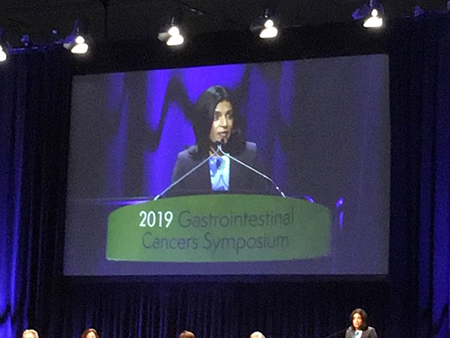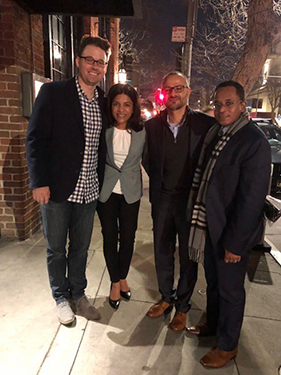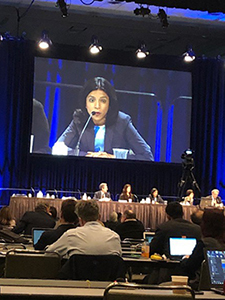 Physicians with the Gastrointestinal (GI) Medical Oncology section at the University of Arizona Cancer Center made a splash at the Gastrointestinal Cancers Symposium, also known as GI 2019, at the Moscone Center in San Francisco, Jan. 17-19, 2019.
Physicians with the Gastrointestinal (GI) Medical Oncology section at the University of Arizona Cancer Center made a splash at the Gastrointestinal Cancers Symposium, also known as GI 2019, at the Moscone Center in San Francisco, Jan. 17-19, 2019.
The event is hosted by the American Society of Clinical Oncology (ASCO) and draws about 3,750 attendees, with a little more than half from the United States. Forty percent are board certified in medical oncology and 20 percent in internal medicine.
“Our team had a great presence at this meeting,” said Rachna Shroff, MD, chief, Section of GI Medical Oncology, UA Cancer Center, and associate professor of medicine, Division of Hematology and Oncology, UA Department of Medicine, UA College of Medicine – Tucson.
“I was on the Program Committee for GI ASCO and was an invited speaker and moderator. I also ran a number of networking/mentoring events for trainees, junior faculty and women during the meeting. In addition, Dr. Hani Babiker had a first author poster presentation as well. And we had a lovely team bonding dinner!”
Among UA attendees were (pictured below from left – click images to enlarge): Aaron Scott, MD, assistant professor of medicine, Division of Hematology and Oncology in the UA Department of Medicine, and member of the Gastrointestinal (GI) Oncology Multidisciplinary Program at the UA Cancer Center; Dr. Shroff; Emad Elquza, MD, associate professor of medicine, Division of Hematology and Oncology, UA Department of  Medicine, UA College of Medicine – Tucson, Gastrointestinal Multidisciplinary Team leader, UA Cancer Center, and medical director, UA Cancer Center North Campus and Orange Grove Campus, Banner – University Medicine; and Hani M. Babiker, MD, assistant professor of medicine, Division of Hematology and Oncology, UA Department of Medicine, associate director, Phase I Clinical Trials Program, UA Cancer Center, and clinical assistant professor, Translational Genomics (TGen) Research Institute, a non-profit genomics research company based in Phoenix.
Medicine, UA College of Medicine – Tucson, Gastrointestinal Multidisciplinary Team leader, UA Cancer Center, and medical director, UA Cancer Center North Campus and Orange Grove Campus, Banner – University Medicine; and Hani M. Babiker, MD, assistant professor of medicine, Division of Hematology and Oncology, UA Department of Medicine, associate director, Phase I Clinical Trials Program, UA Cancer Center, and clinical assistant professor, Translational Genomics (TGen) Research Institute, a non-profit genomics research company based in Phoenix.
Dr. Babiker had an abstract included as a poster in the poster session for “Cancers of the Pancreas, Small Bowel, and Hepatobiliary Tract,” that included others on the team as co-authors. The research was titled, “A phase I/II study of RX-3117, an oral antimetabolite nucleoside, in combination with nab-paclitaxel (nab-pac) as first-line treatment of metastatic pancreatic cancer (met-PC): Preliminary results.”
But Dr. Shroff was the UA’s star of the event as both a presenter and panelist as well as a participant in multiple networking activities on the agenda.
At the general session on “Advancements in Treatment of Cholangiocarcinoma and Hepatocellular Carcinoma,” she spoke on the idea of “Novel Therapies for Cholangiocarcinoma: One Size Fits All?”
 She served as panel moderator on another general session on “Personalized Therapy for Advanced Esophago-Gastric Malignancies.”
She served as panel moderator on another general session on “Personalized Therapy for Advanced Esophago-Gastric Malignancies.”
And she chaired three networking events—"Trainee and Early-Career Networking Luncheon," "Networking Luncheon: Careers in Oncology—Expert Advice and Guidance," and the "Women’s Networking Event."
ALSO SEE:
“Pancreatic Cancer Patients with BRCA Mutation May Benefit from Targeted Drug” | Posted June 15, 2018
“Five DOM Faculty Elected to Six Posts on UA College of Medicine – Tucson 2018-19 Committees” | Posted June 12, 2018
“Dr. Rachna Shroff Joins UA Cancer Center as Section Chief of Gastrointestinal Medical Oncology” | Posted May 15, 2018

